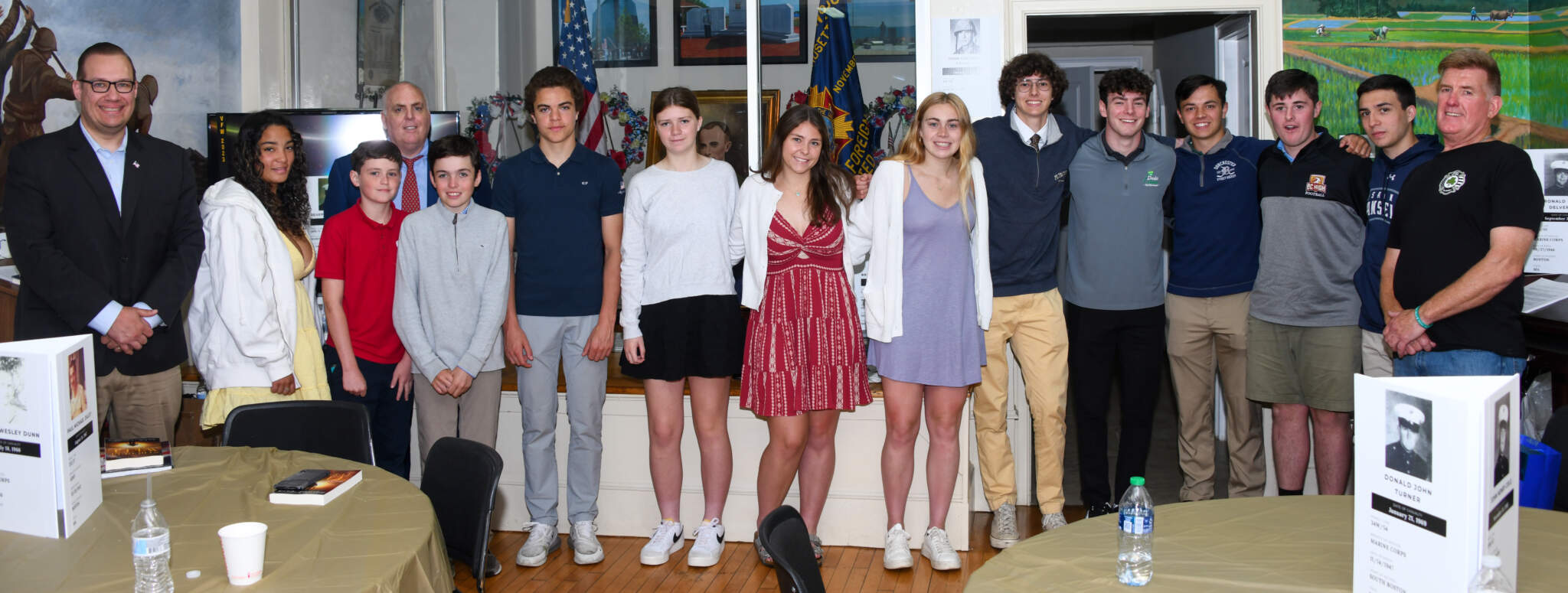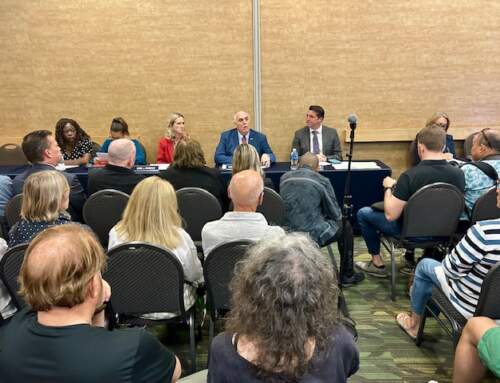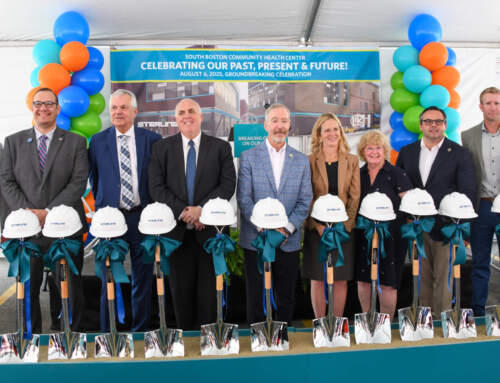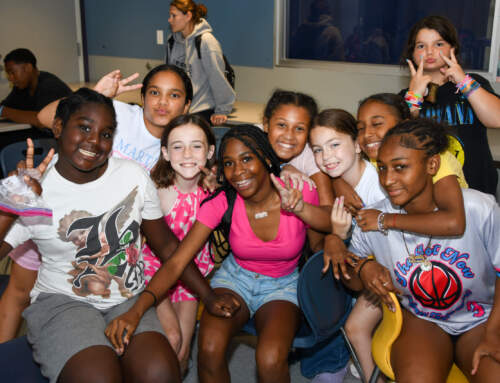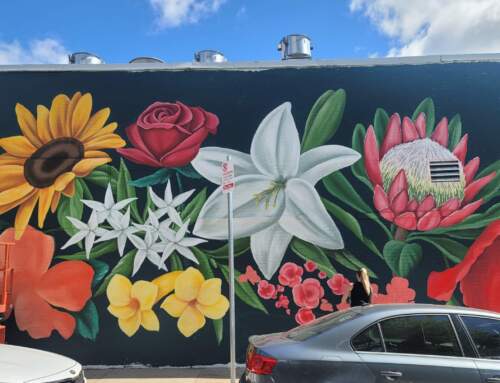Twelve outstanding students who have demonstrated community involvement and an understanding of post-traumatic stress disorder and its effects have been awarded Timothy (Doc) Cook Scholarships.
The scholarships are given in memory of Tim Cook, a Navy Corpsman who brought medical care to wounded soldiers on the battlefield. He was 28 years old in March 2013 when he lost his battle with PTSD from his combat experiences.
The scholarship recipients were honored Sunday at a ceremony at the Thomas J. Fitzgerald VFW Post 561 attended by veterans, City Council President Ed Flynn, Rep. David Biele, outgoing Boston Police VFW 1018 Commander Craig DeOld, and friends and family.
“The Timothy (Doc) Cook Foundation is dedicated to educating our youth and increasing awareness of PTS/PTSD within our community,” Tim’s dad, Joseph Cook, said.
“There’s an old saying in the military that old soldiers never die, they simply fade away. Without a mission, some vets adapt and overcome while others struggle to integrate into society,” Cook said. “The Timothy (Doc) Cook Foundation has chosen not to let his or any other veteran’s legacy fade away.”
Cook quoted Albert Pike: “What we have done for ourselves alone dies with us; what we have done for others and the world remains and is immortal.”
“The Timothy (Doc) Cook Foundation will continue to have spirit, hope, and strength, to make a difference for others.”
The foundation provides scholarships to South Boston youth attending tuition-based schools in grades 7-12. To date, more than $80,000 in scholarships have been awarded. The money for the scholarships comes from the Shamrock Showdown hockey tournament.
The following students were honored:
CONNOR NEE
Connor, a senior at BC High who will be attending Fairfield University in the fall, believes more veteran housing is a possible solution for vets who are suffering from PTSD. He also thinks the VA should create more programs like Home Base to educate vets and their families about healthy coping skills. Connor feels he could help veterans personally by using his media company (Connor Nee Media) to highlight the struggles of veterans and get the younger generations to appreciate veterans.
GREG MATTHEWS
Greg, a junior at BC High, comes from a military family. He would like to dedicate a rugby game to increase PTSD awareness and raise funds that would go to veterans’ mental health. As vice captain of the Bowman House at BC High, Greg will be organizing speakers to talk to his peers about PTSD. Greg said that family members can experience the adverse effects of PTSD, so it’s important for veterans and their families to seek treatment and the services they need and deserve.
VASYA MANTROV
Vasya, a junior at BC High, said that the trauma veterans see on the battlefield can be so severe that the symptoms can be lifelong and affect family members as well. Vasya has done his research on Stellate Ganglion Block, an outpatient procedure that can subdue the body’s fight or flight instinct. A repeat recipient of this scholarship, Vasya often looks at situations and activities with veterans with PTSD in mind. He volunteered at an animal sanctuary where he cared for disabled animals, many of whom had PTSD.
PETE LUECKE
Pete, a sophomore at BC High going to Thayer Academy in September, is a military brat. Pete said that PTS is a normal reaction to a scary or dangerous event; but the stress can become a disorder, PTSD, when it doesn’t get better over time. Pete said veterans could be helped if they had more sports opportunities. When fellow veterans are together, they can share their experiences. Pete would like to see the 155 MA VFW posts organize sports leagues to give vets a social group to engage in healthy activities and make them feel part of a team. Pete said you never know what someone is dealing with, and a friendly gesture might make a big difference.
BRENNAH HYNES
Brennah, a senior at Dexter Southfield who will attend Saint Anselm’s in the fall, said sports is a major contributor to mental health. She recalled a hockey teammate who was injured and it affected her physically and mentally. By doing little things for her friend, she could tell how much that was appreciated. Brennah prepared a PowerPoint to explain what mental health is and the effects it has on athletes. Brennah comes from a family of veterans and she shows her appreciation for them by sending cards, a small act of kindness that helps keep morale strong.
RORY SHIELDS
Rory, a sophomore at Archbishop Williams, had a great uncle who was a World War II vet and POW. When he returned to Southie, he was never the same. At the time there was no help for veterans suffering from Combat Stress Reaction; PTSD was not diagnosed until 1980. Rory thinks politicians should create laws so vets suffering from PTSD have a place to live and can get jobs and treatment. Rory also wants to see a law that would teach kids about mental health and PTSD.
KATHRYN GREENE
Kathryn, a junior at Kent Hill School, said people who suffer from PTSD often don’t ask for help because they think that is a sign of weakness. People who are suffering need to know it’s not a negative thing to ask for help. Kathryn said people need to stop putting a stigma on mental health. The community needs to let people with PTSD/mental illness know they are not alone. Kathryn will be spreading PTSD awareness through social media as well as word of mouth “because it is an old-school Southie way and very powerful.” She said it’s important to spread awareness because even if you haven’t experienced PTS, at least you’ll be more educated and able to help those who have.
MAE LAFFERTY
Mae, a senior at Matignon who will attend New England College in the fall, comes from a long line of military members. Mae believes communities can work to reduce the stigma by selling ribbons and flags to raise awareness. She would also like to see veteran groups speak at local schools. “Sharing information with students in our communities will bring veterans and kids together to listen and learn about veterans’ service to our nation.” Mae said that brave veterans fought for us so it makes sense that it should be an honor for our communities to fight for them.
LIAM LONG
Liam, a seventh-grader at Saint Sebastian’s, would like to help veterans who are suffering by starting a 10-person rap session where they can talk among themselves and share their experiences. “Hopefully these sessions will help these veterans to be more open and teach them to cope with issues of stress so they can spend more time with their families.”
MATTHEW STUDLEY
Matthew, a senior at BC High who will attend Fairfield University in the fall, said organizing discussion groups at school can help increase PTSD awareness. Matt would use resources such as Home Base, TAPS, and the Run to Home Base to raise awareness on a social media platform about PTSD. With a goal of helping veterans transition back to civilian life, Matt would like to create a program where vets can learn to balance their budgets so they can focus on their well-being.
DYLAN PICARD
Dylan, a junior at Archbishop WIlliams, has two close family members who served in the military and feels that he can spread awareness by sharing what they have told him about their experiences. Dylan always tells his friends that people who have experienced trauma might have high emotions and flashbacks and that kindness goes a long way. Dylan would like to see more resources in schools to educate youth about mental health issues such as PTSD.
NOLAN BURNS
Nolan, a seventh-grader at Catholic Memorial, shares what he knows about PTSD because his uncle, who served in Iraq, came back a different person. But with the love and support from his family, his uncle got the help he needed. To increase PTSD awareness, Nolan would have awareness days and write articles in local newspapers highlighting personal stories. Nolan learned from Medal of Honor recipient 1st Lt. Brian Thacker that small actions and decisions made by ordinary people can have an extraordinary impact on the lives of many.
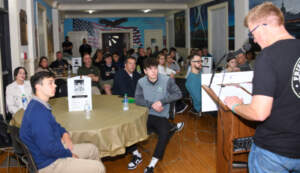
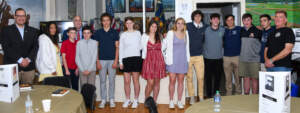
From left: State Rep David Biele, Kathryn Greene, Nolan Burns, City Council President Ed Flynn, Liam Long, Pete Luecke, Rory Shields, Mae Lafferty, Brennah Hynes, Vasya Mantrov, Connor Nee, Matthew Studley, Greg Matthews, Dylan Picard, and Joseph Cook.

